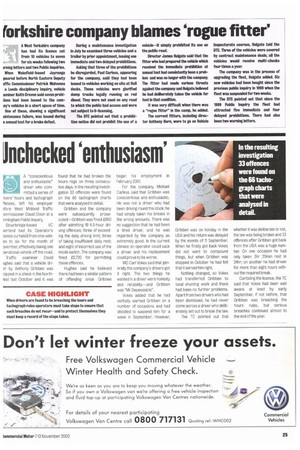forkshire company blames 'rogue fitter'
Page 25

If you've noticed an error in this article please click here to report it so we can fix it.
A West Yorkshire company has had its licence curt from 10 vehicles to seven for six weeks following two timing letters and two Public Inquiries. When Wakefield-based Jayrange peared before North Eastern Deputy iffic Commissioner Patrick Mulvenna a Leeds disciplinary inquiry, vehicle aminer Keith Craven said seven prohiLions had been issued to the coinny's vehicles in a short space of time. One of these, showing a significant aintenance failure, was issued during e annual test for a brake defect. During a maintenance investigation in July he examined three vehicles and a trailer by prior appointment, issuing one immediate and two delayed prohibitions.
Asking that three of the prohibitions be disregarded, Paul Carless, appearing for the company, said they had been issued to vehicles working on site at Hull docks. Those vehicles were glorified dump trucks legally running on red diesel. They were not used on any road to which the public had access and were not subject to 0-licensing.
The DTC pointed out that a prohibition notice did not prohibit the use of a vehicle—it simply prohibited its use on the public road.
Director James Hotgate said that the fitter who had prepared the vehicle which received the immediate prohibition at annual test had consistently been a problem and was no longer with the company. The fitter had made various threats against the company and Reigate believed he hail deliberately taken the vehicle for test in that condition.
It was very difficult when there was a "rogue fitter" in the camp, he added.
The current fitters, including director Anthony Horn, were to go on Vehicle Inspectorate courses, Holgate told the DTC. Three of the vehicles were covered by contract maintenance deals; all the vehicles would receive multi-checks four times a year.
The company was in the process of upgrading the fleet, Hoigate added. Six new vehicles had been bought since the previous public inquiry In 1999 when the fleet was suspended for two weeks.
The OTC pointed out that since the 1999 Public Inquiry the fleet had attracted five immediate and four delayed prohibitions. There had also been two warning letters.




























































































































































